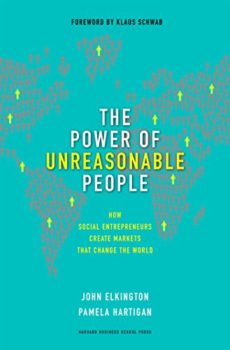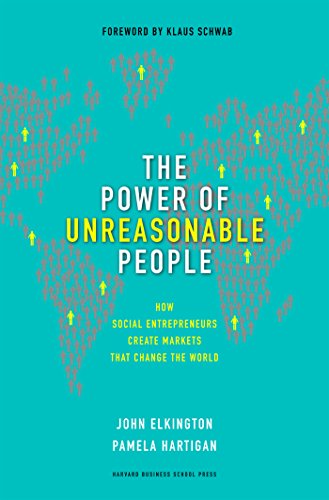
For more than a decade I’ve been deeply immersed in the world of social entrepreneurship. Yet somehow I neglected to read this important book when it was first published four years ago. (I acquired a copy, stuck it on a shelf, and promptly forgot all about it.) To my mind, The Power of Unreasonable People ranks with David Bornstein’s seminal work, How to Change the World, as a point of entry into this fascinating, and increasingly important, realm.
The field of social entrepreneurship, still early in its development after Bill Drayton first gave the concept prominence early in the 1980s with the launch of Ashoka, is rife with disagreement. Some observers insist that a social enterprise must be a not-for-profit enterprise. Others assert that only for-profit ventures qualify for the label. Fortunately, John Elkington and Pamela Hartigan believe that the whole range of organizational forms can be thought of as “social enterprises.” I say fortunately because (a) I agree with them, and (b) to insist otherwise is to miss so much of what is exciting in the field.
The Power of Unreasonable People: How Social Entrepreneurs Create Markets That Change the World, by John Elkington and Pamela Hartigan ★★★★★
The Power of Unreasonable People covers the landscape, describing examples from virtually every area of interest in development, from healthcare to education to poverty eradication. In fact, the book is most rewarding in its presentation of vignettes of individual social enterprises, including interviews with many of their principals. A lot of the examples are familiar to anyone active in the field. Some are not. However, this is no mere collection of case studies. The authors embed each organization within a typology of their devising, allowing the reader to get a sense of how they may be compared with one another. The Power of Unreasonable People concludes with a discussion of the structural changes that are essential if humankind is to prevail in the face of endemic poverty on three continents, ethnic and religious conflicts, and the growing impact of climate change.
John Elkington and Pamela Hartigan are two of the most qualified people in the world to have written this book. Elkington, a force in the area of corporate social responsibility for three decades and a prolific author, co-founded the consultancy SustainAbility in 1987 and originated the term Triple Bottom Line in the 1990s. Hartigan served as founding managing director of the Schwab Foundation for Social Entrepreneurship from 2001 to 2008, partnered with Elkington to establish the consultancy Volans, and now works as Director of the Skoll Centre for Social Entrepreneurship at Oxford University.
For further reading
This is one of the Best books about innovation reviewed here.
Like to read books about business? Check out My 10 favorite books about business history.
If you enjoy reading nonfiction in general, you might also enjoy:
Top 10 nonfiction books about politics
And you can always find my most popular reviews, and the most recent ones, plus a guide to this whole site, on the Home Page.



























